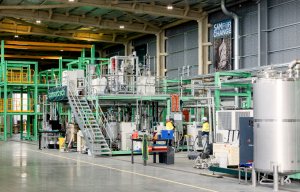
Samsara Eco opens plant in Australia
Affordability and accessibility the keys to wide-scale adoption.

28th July 2025
Innovation in Textiles
|
London
In a just-published report from London-headquartered consultant Systemiq, it is suggested that extended producer responsibility (EPR) fees in the range of €250-330 per ton need to be imposed on polyester-rich fabrics and apparel put on the EU market, to effectively cover the net costs of the collection, sorting and recycling of post-consumer waste in a scaled system.
In January 2025, a ban was introduced on the incineration or landfilling of waste clothing and textiles within EU member states and EPR programmes are subsequently being introduced in the member states.
Currently only 1% of textile waste is recycled back into textile fibres and around 6-7 million tons of it is generated in the EU each year. Polyester accounts for around 57% of global fibre demand and is viewed as key to establishing circular recycling solutions at scale.
Decisive action
According to the Systemiq report, entitled The Textile Recycling Breakthrough, the recycling of polyester-based textile waste in Europe can reach the necessary scale and adoption if policymakers and industry act decisively now.
Advanced textile recycling technologies have developed significantly in recent years but remain evolutionary in their adoption.
Depolymerisation methods are a promising solution for processing large proportions of Europe’s growing volumes of polyester textile waste when reuse or mechanical recycling are not viable. These depolymerisation technologies are both environmentally attractive and technically capable of producing virgin-equivalent outputs.
However, despite its attractiveness, depolymerisation is not yet scaling. To reach a tipping point for mass adoption, where recycling polyester waste through depolymerisation becomes more competitive than virgin polyester production from fossil fuels, two more conditions must be met – affordability and accessibility.
Affordability remains the most significant constraint – producing recycled polyester from post-consumer textile waste in Europe costs around 2.6 times more than the average cost of virgin polyester in Asia.
Accessibility challenges exist on both the supply and demand side. On the supply side, access to textile waste feedstock at the necessary quality and quantity for at-scale recycling remains out of sight.
On the demand side, the current premium of around 2.6 means that most brands continue to favour cheaper virgin polyester or recycled polyester from PET beverage bottles, while the production value chain has little incentive to incorporate this material on its own accord. Without targeted policy action to address both affordability and accessibility, depolymerisation will remain stuck in pilot purgatory, and the breakthrough to mass adoption will not happen.
Tipping points
A breakthrough is possible – if the right levers are pulled, Systemiq believes.
The Textile Recycling Breakthrough applies a tipping points framework to this challenge. With input from a steering group comprising 17 organisations across the value chain it presents a detailed analysis of the cost gap between recycled polyester from post-consumer waste and virgin polyester from fossil fuels – and shows how Europe can lead on creating a competitive, circular textile industry.
The study identifies ten levers for policy and industry action across four areas of intervention – improving access to feedstock, strengthening offtake demand, reducing production costs and levelling the remaining cost gap through EPR funding and a green level premium.
With these interventions, Europe could reach a tipping point – where recycled polyester from post-consumer waste becomes more accessible, affordable and attractive than virgin alternatives. As a result, depolymerisation capacity could grow nearly tenfold by 2035 – helping reduce the fashion sector’s environmental impact by cutting waste and emissions and reducing dependence on virgin raw materials.
An earlier Systemiq study showed that a broader system change across PET packaging and polyester textiles – combining depolymerisation and mechanical recycling, reduction and reuse – could generate €5.5 billion in annual value and create 28,000 net new jobs in Europe’s recycling sector by 2040.
The report was funded by grants from Arc’teryx, Eastman, Interzero, Textile Exchange and Tomra and guided by an independently chaired steering group representing industry, civil society and academia to ensure its independence and rigour.

Business intelligence for the fibre, textiles and apparel industries: technologies, innovations, markets, investments, trade policy, sourcing, strategy...
Find out more